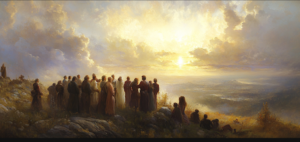In March 2020, as the world itself seemed to collapse, my heart broke for another reason as I grieved the sudden and tragic loss of my sister. She had been taken by a random act of violence, shot while sitting and texting in her car, parked in her friend’s driveway in Salt Lake at only 9:00 at night. Her death occurred on the birthday of my only brother, who had passed a few years before due to complications from a tooth infection. Before that, my youngest sister had been taken because of complications following a car accident, and some years prior, my mother had passed after a brutal battle with lung cancer. Between these deep losses, during those years, we lost dozens more among grandparents, in-laws, cousins, aunts, uncles, and dear friends. It felt as if a gathering was taking place in my family on the other side of the veil.
The hope of a promised reunion with my loved ones only intensifies my anticipation for the Savior’s return. Even as a child, the thought of the Second Coming of Jesus Christ filled me with a sense of wonder. I was one of those kids who sang the primary song, “I wonder when he comes again,” with fervent (if not a little dramatic) sincerity—and to this day, my anticipation has only grown. Over the years, though, I’ve learned to publicly temper my enthusiasm for the Second Coming. At times, I’d be met with confusion, suspicion, or even anger if I shared my excitement openly. But recently, as the world seems increasingly aware of what lies ahead, I’ve seen more and more kindred responses—from a quiet nod, a whispered “me too,” enthusiastic hallelujahs, and high fives. It feels as if we are gradually, collectively, allowing ourselves to bring the subject out of the fringes and express the same longing. The Second Coming is not only a doctrine of preparedness but one of joy, justice, redemption, and reunion.
Anticipating the Savior’s Return: The Joyful Awaiting
The doctrine of Christ’s return is meant to comfort and energize believers. The Second Coming is not only a doctrine of preparedness but one of joy, justice, redemption, and reunion with loved ones and with Christ. A faith-based element of anticipation differs from secular anticipation as it provides a transcendent sense of purpose and patience.
I take comfort in Elder D. Todd Christofferson’s words that “it is supremely important to prepare the world for the Second Coming of the Lord Jesus Christ.” He paints a vivid picture of that day: a day when “the wolf shall dwell with the lamb…[and] they shall not hurt nor destroy”; a day when “poverty and suffering will vanish,” when “God shall wipe away all tears.” Christ will govern, and even death will lose its sting.
In that day, an infant shall not die until he is old; and his life shall be as the age of a tree;
And when he dies he shall not sleep, that is to say in the earth, but shall be changed in the twinkling of an eye, and shall be caught up, and his rest shall be glorious” (D&C 101:30–31).
Just consider one aspect of the promised millennium and imagine what the reality of that season can be for us. Some may say, “It sounds beautiful, for sure, but then why am I scared or anxious when the subject is raised?”

Fear Not
The promises to the faithful include peace, comfort, protection, and joy at His coming—yet always with a qualifier: these blessings are for the faithful. We each sense there is more we could do to prepare and more meaningful ways we could spend our time. Often, we feel the gaps in personal discipleship and fear that we won’t be counted among the faithful. Aware of our imperfections, it’s reasonable to feel concerned that even if we imagine the joy, we will surely miss out on finding comfort, protection, and peace amid the prophesied chaos surrounding the Lord’s return. Often, we feel the gaps in personal discipleship and fear that we won’t be counted among the faithful.
The belief that only the most righteous members of the Church will survive while everyone else is swept away is unfounded. The prophet Joseph Smith taught that millions of good people, both in and out of the Church, who live by a terrestrial law, will remain upon the face of the earth. The Savior Himself offers this comforting promise, “Be of good cheer, and do not fear, for I the Lord am with you.”
Feeling a lack of preparation can also induce fearful emotions. Can Christ come if you don’t have a generator and updated 72-hour kits? The admonition to prepare and become self-reliant has endured through generations of Saints. Recently Elder David A. Bednar, in regards to preparedness, added this counsel “The consistency of prophetic counsel over time creates a powerful concert of clarity…” reminding us it is still relevant. Quoting from an earlier article on the subject, it’s helpful to remember “that panic and fear are almost never how prophets of God speak of preparedness. Rather, words like providence, self-reliance, and blessings are more commonly used. God’s house is a house of order, and we are invited to create our own home based on the same transcendent principles.”
Gathering In
The observation that more people are openly longing for the Second Coming is likely due to recent comments and events that have heightened people’s awareness, making it easier to discuss the anticipation of Christ’s return—most notably, President Russell M. Nelson’s October General Conference talk. As one astute millennial noticed, President Russell M. Nelson mentioned the Second Coming seven times in his brief address. This talk was followed by a lesson plan for members’ use, a number of Church News press releases, and numerous mentions by other General Authorities of the Church. But this isn’t President Nelson’s first invitation to consider, discuss, and plan for the Second Coming; in his talks, he has mentioned it in some form over fifty times. More people are openly longing for the Second Coming.
For me, this gathering will mean joyful reunions and cherished time with dear souls on the other side. President Nelson’s invitation to participate in the gathering is a privilege and a sacred charge. Let’s answer through small, meaningful actions and allow ourselves to embrace anticipation for His coming—maybe even put up the Christmas tree a little earlier this year, savoring the joy that’s yet to come.

















